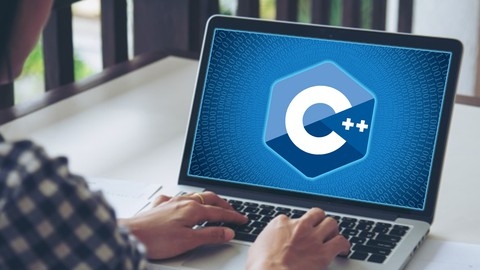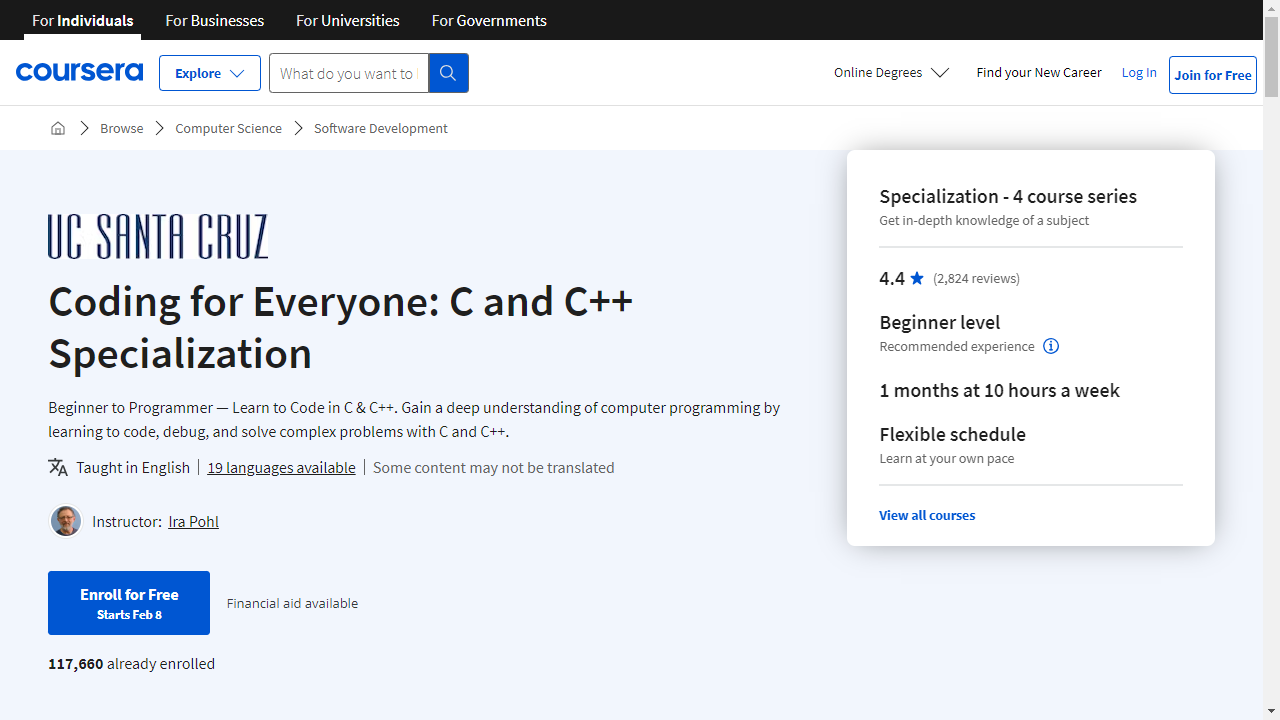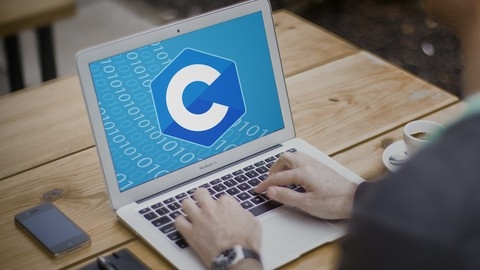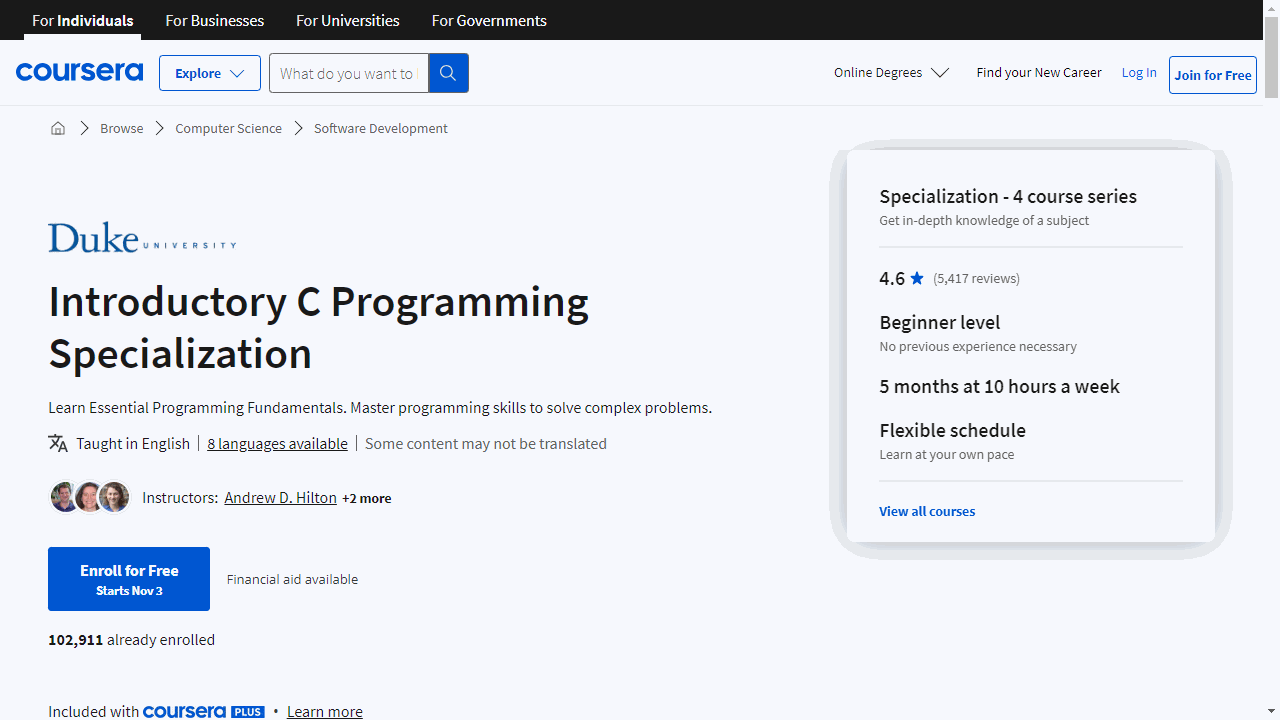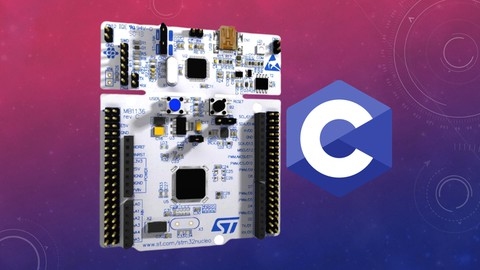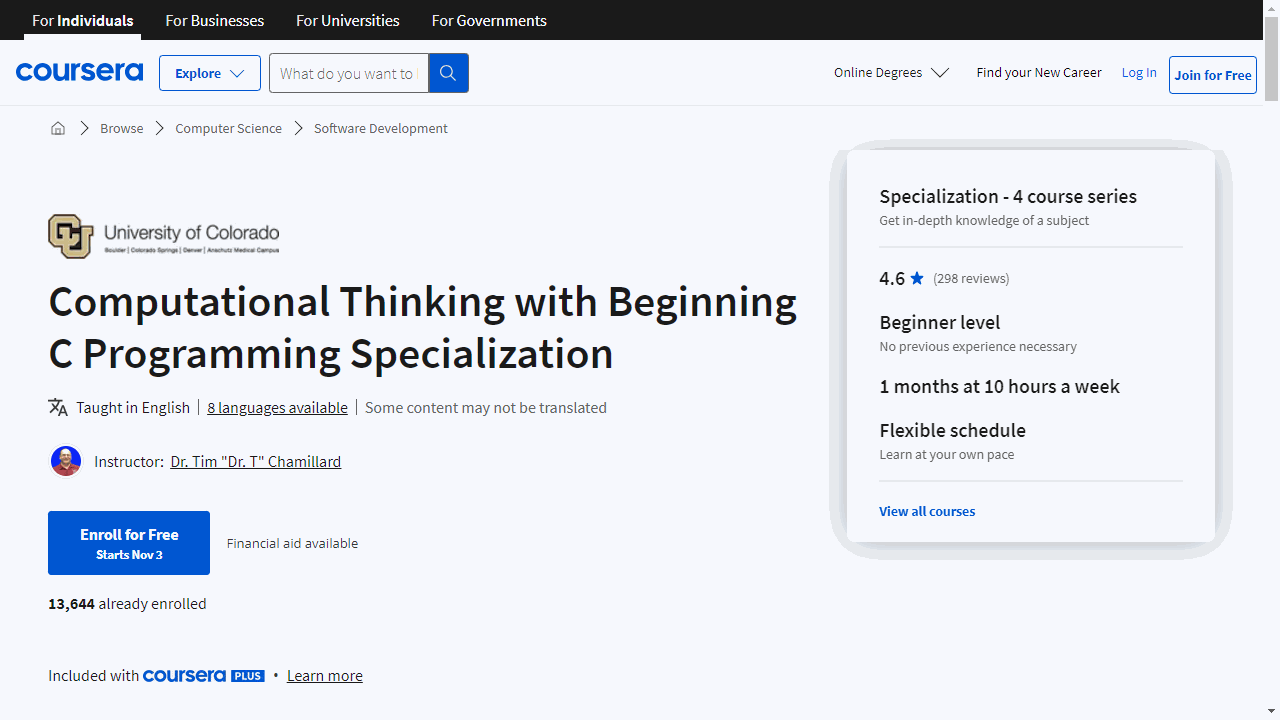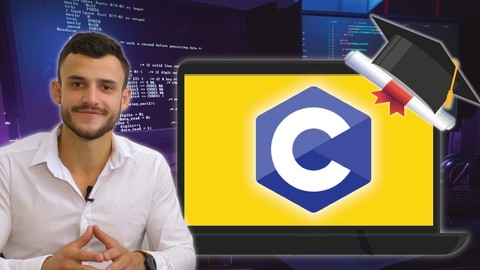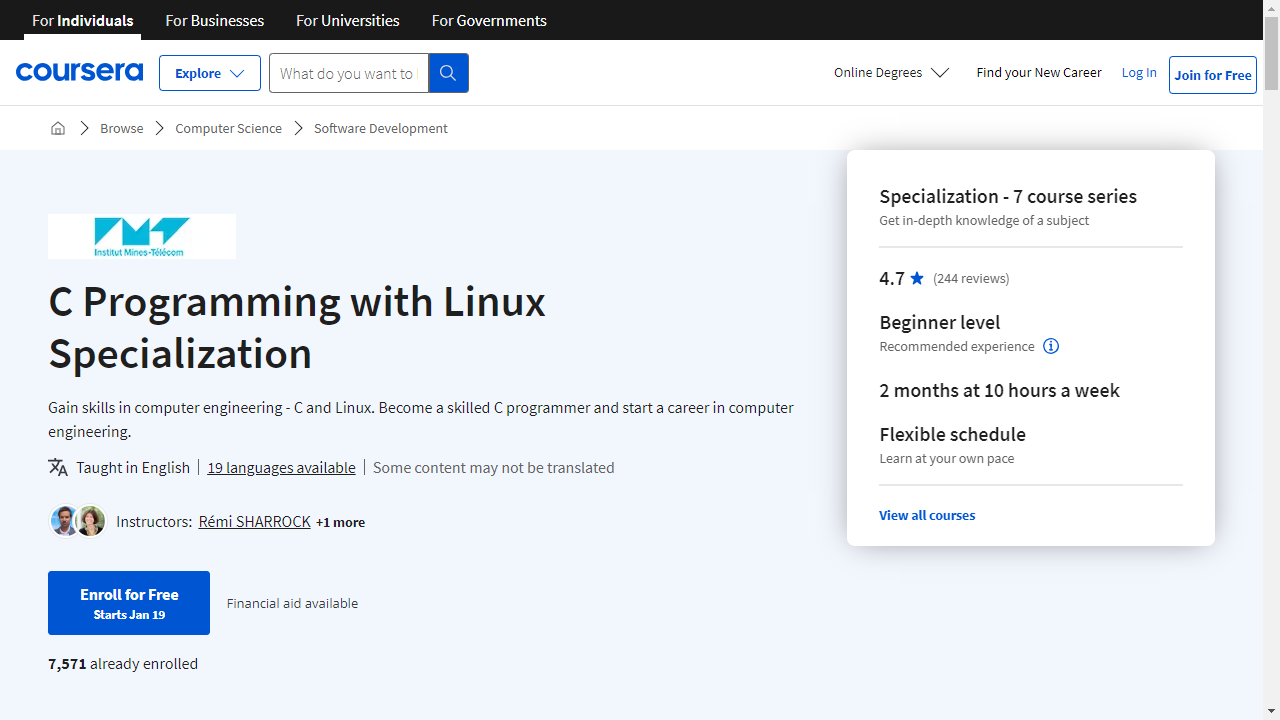C is a powerful and foundational programming language used to build a wide range of applications, from operating systems and embedded systems to high-performance scientific software.
Learning C equips you with fundamental programming concepts like procedural programming, memory management, and data structures, making you a highly sought-after programmer in various industries.
By mastering C, you can create efficient, robust, and portable applications that tackle complex challenges at a low level.
However, finding a high-quality C course that caters to your learning style and provides a comprehensive understanding of the language can be a challenge.
You’re likely looking for a course that balances theory with practical examples and hands-on projects, ensuring you gain the skills and confidence to apply your knowledge in real-world scenarios.
Based on our research and analysis, we believe Coding for Everyone: C and C++ Specialization on Coursera stands out as the best overall C course.
This comprehensive specialization takes you from the basics to advanced concepts, covering everything from variables and operators to pointers, structures, and file I/O.
With its clear explanations, engaging examples, and hands-on exercises, this course provides a solid foundation for anyone looking to master C.
While this is our top recommendation, we understand that you might have specific needs and preferences.
That’s why we’ve compiled a list of other exceptional C courses that cater to various learning styles, skill levels, and areas of focus.
So, keep reading to explore other great options and find the perfect course to embark on your C programming journey.
Coding for Everyone: C and C++ Specialization
Provider: Coursera
This specialization guides you from the basics of C programming all the way to advanced C++ concepts.
You’ll begin with “C for Everyone: Programming Fundamentals”, where you will learn to write, compile, and run your first C programs.
This course covers the fundamentals like arrays, pointers, functions, and data types, giving you a solid foundation.
The specialization continues with “C for Everyone: Structured Programming.”
Here, you’ll build upon your basic C knowledge and explore more complex techniques like using command-line arguments and even get a taste of C++ programming.
This course teaches you how to write more complex and robust programs.
Once you have a good grasp of C, you’re ready to transition to C++ with “C++ For C Programmers, Part A”.
This course focuses on converting your existing C code to C++ and introduces you to C++ container classes like vectors and maps, which are efficient tools for managing data.
You’ll also delve into algorithms, specifically learning how to implement Dijkstra’s shortest path algorithm, which is used to find the shortest route between two points in a network.
Finally, you’ll dive into advanced C++ concepts with “C++ for C Programmers, Part B”.
You’ll learn how to use the Standard Template Library (STL), a powerful set of tools for data structures and algorithms.
You’ll explore object-oriented programming concepts like inheritance and apply them in C++.
You’ll even explore the world of game theory and learn how to implement algorithms like Min-Max and Alpha-Beta, which are used in creating game-playing artificial intelligence.
C Programming For Beginners - Master the C Language
Provider: Udemy
This C programming course on Udemy is perfect if you’re just starting with coding.
You’ll gain practical experience with the C language, beginning with the basics like variables, data types, and operators.
The course teaches you to write, compile, and run your programs using CodeLite, a powerful code editor.
Plus, you can follow along using Windows, Mac, or Linux, including Ubuntu.
You’ll learn essential concepts like control flow, which involves using if statements, loops, and switch statements to control how your program makes decisions.
You’ll dive into arrays and discover how to use them effectively to store and manipulate collections of data.
The course introduces functions, teaching you to break down complicated problems into smaller, more manageable chunks.
You’ll even design a Tic Tac Toe game, allowing you to apply your knowledge and create a complete project.
Get ready to explore the world of pointers, a fundamental concept in C. You’ll develop a deep understanding of memory management and learn to use functions like malloc, calloc, and realloc for dynamic memory allocation.
The course covers structures, a powerful way to organize your data, and teaches you how to use them effectively.
You’ll also learn about file input and output, a crucial skill that enables your programs to interact with files on your computer.
Finally, you’ll become familiar with the standard C library, a collection of pre-built functions that simplify common tasks, from mathematical calculations to string manipulation.
Introductory C Programming Specialization
Provider: Coursera
This specialization guides you through the world of C programming, a powerful language used everywhere in computer science.
You’ll begin with “Programming Fundamentals,” mastering the art of breaking down problems into algorithms - those step-by-step instructions that form the backbone of any program.
This course sets the stage, teaching you to think like a programmer, a skill transferable to any programming language you might encounter later.
Next, “Writing, Running, and Fixing Code in C” plunges you into the practicalities of writing C code.
You’ll learn to plan your programs, compile and run them, and inevitably, debug them.
This systematic approach to identifying and rectifying errors will make you a more efficient and confident programmer.
“Pointers, Arrays, and Recursion” introduces you to powerful C programming tools.
Imagine pointers as special variables that give you direct access to your computer’s memory.
Arrays, on the other hand, help you organize and store large amounts of data efficiently.
Then there’s recursion, a technique where a function calls itself, proving particularly useful for specific problem-solving scenarios.
Finally, “Interacting with the System and Managing Memory” equips you with the skills to write programs that interact with the user and the system.
You’ll delve deeper into pointers, work with multidimensional arrays, and discover how to read and write files.
This course also introduces dynamic memory allocation, a crucial concept for programs dealing with large, variable amounts of data.
You’ll put all this knowledge to the test by building a program that uses a Monte Carlo simulation to calculate poker hand probabilities.
Microcontroller Embedded C Programming: Absolute Beginners
Provider: Udemy
You’ll begin by setting up your programming environment with STM32CubeIDE and GCC, tools essential for embedded systems.
The course utilizes the popular ARM Cortex M4 microcontroller, mimicking real-world applications.
You’ll then delve into C programming fundamentals, mastering data types, variables, pointers, and functions.
Hands-on exercises, like controlling an LED with code, will solidify your understanding.
You’ll even learn how memory operates and how to examine your code’s execution using assembly language.
The course demystifies the ‘volatile’ keyword, crucial for optimizing code and preventing unexpected behavior when interfacing with hardware.
This course doesn’t shy away from essential concepts like structures, unions, and bit fields, which are vital for interacting with microcontroller registers.
This knowledge empowers you to manipulate LEDs, buttons, and other peripherals directly.
Through practical exercises, such as reading from a keypad and creating delay functions, you’ll gain valuable hands-on experience.
You’ll also explore compiler optimization techniques and how to analyze your code’s efficiency.
Beginning C++ Programming - From Beginner to Beyond
Provider: Udemy
This C++ course will take you from a beginner to beyond with its comprehensive curriculum.
You will establish a strong foundation by learning about the C++ standard, the process of creating and executing programs, and setting up your programming environment.
You’ll explore installing necessary tools like MinGW C++ compiler on Windows, CodeLite on Mac OSX, or using the command-line interface on Ubuntu Linux.
You will then master the core components of C++ programs, including preprocessor directives, comments, the main() function, and the use of cin and cout for input and output operations.
The course then covers variables, constants, arrays, vectors, operators, and control flow statements, such as “if”, “else”, “switch”, “for”, “while”, and “do-while” loops.
You will also learn to use “continue” and “break” statements.
You’ll gain a deep understanding of pointers, references, dynamic memory allocation, and how to use the “const” qualifier.
The course thoroughly explains object-oriented programming (OOP), guiding you through the concepts of classes, objects, access modifiers, constructors, destructors, and more.
You will delve into advanced OOP concepts like operator overloading and inheritance, understanding how to create hierarchies of classes and work with virtual functions and abstract classes.
The course also covers smart pointers for robust memory management and explores exception handling techniques for writing reliable C++ applications.
Finally, you’ll be introduced to the Standard Template Library (STL), where you’ll learn about containers like vectors, lists, sets, maps, iterators, algorithms, and container adaptors.
You’ll even get a taste of lambda expressions, adding another powerful tool to your programming arsenal.
Computational Thinking with Beginning C Programming Specialization
Provider: Coursera
You’ll begin with computational thinking, learning how algorithms provide instructions for computers.
You’ll write your first C program, discover how to store data, and explore data analysis and representation.
You’ll then move on to selection, which is choosing which code to execute, and iteration, which repeats code blocks.
The specialization also covers abstraction, simplifying complex problems, and problem decomposition, breaking down large problems into smaller ones.
You’ll use arrays and strings, learn how to write functions, and gain a deeper understanding of pointers.
Throughout the course, you’ll apply your knowledge to STEM computations, data analysis, and simulation.
You’ll even work with file input and output, allowing interaction with files on your computer.
Finally, you’ll delve into algorithm analysis, evaluating the efficiency of your code.
C Programming Bootcamp - The Complete C Language Course
Provider: Udemy
This C programming course begins with the fundamentals of programming.
You will learn how to set up your development environment using CodeBlocks or Visual Studio.
You will then learn how to write your first C program.
The course teaches you core concepts like variables, data types, control flow using if/else statements and loops, and working with arrays and strings.
The course then dives into more complex concepts like pointers and recursion.
While these may seem intimidating, the instructor makes them understandable through clear explanations, animations, and visuals.
You will learn how to use pointers to manipulate memory addresses directly and how to use recursion to solve complex problems.
This course also covers practical topics like working with files and structures.
You will learn how to create, read, and manipulate files using C, as well as how to use structs to group different data types.
You will even get the chance to work with advanced data structures like 2D Arrays.
The course also prepares you for job interviews by covering common C programming interview questions.
C Programming with Linux Specialization
Provider: Coursera
This Coursera specialization equips you with the skills to write efficient C programs and work within the Linux environment.
You’ll start with the fundamentals of C programming, learning to write simple programs, work with variables like int, double, and char, and use loops like for-loops for repetitive tasks.
You’ll quickly grasp the essentials, even without prior programming experience.
The specialization then introduces you to more advanced concepts.
You’ll learn about logical statements and how to use them with arrays to organize and manipulate data.
You’ll implement algorithms like bubble sort and selection sort, gaining a deeper understanding of data manipulation.
You’ll then delve into the heart of C programming: pointers and memory management.
Through clear explanations and visualizations, you’ll learn how computers store data and how to use pointers effectively.
You’ll understand how to dynamically allocate memory and work with structures, creating custom data types for your programs.
Finally, you’ll transition to Linux.
You’ll master the command line interface, navigate the file system using Linux commands, and learn how to compile and execute your C programs in this powerful environment.
You’ll even explore how to use libraries and makefiles, taking your C programming skills to a professional level.
Also check our posts on:
